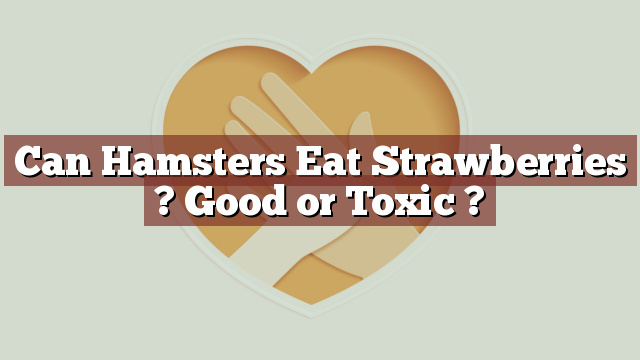Can Hamsters Eat Strawberries? Good or Toxic?
It is important for hamster owners to be aware of the foods that are safe for their furry little friends to consume. While hamsters have specific dietary requirements, it is natural for owners to wonder if they can treat their pets to a sweet and juicy snack like strawberries. This article will provide you with all the information you need to know about feeding strawberries to hamsters, including their nutritional value, potential risks and benefits, and what to do if your hamster consumes this fruit.
Nutritional Value of Strawberries for Hamsters
Before we delve into whether hamsters can safely eat strawberries, let’s take a look at the nutritional value of this fruit. Strawberries are packed with essential vitamins and minerals, making them a nutritious choice for humans. They are an excellent source of vitamin C, which plays a crucial role in boosting the immune system and promoting overall health. Additionally, strawberries contain dietary fiber, which aids in digestion, and antioxidants that help fight against harmful free radicals in the body.
Can Hamsters Safely Eat Strawberries?
Yes, hamsters can safely eat strawberries. While their primary diet should consist of high-quality hamster food and occasional fresh vegetables and fruits, strawberries are generally considered safe for hamsters to consume in moderation. However, it is important to note that each hamster’s tolerance to different foods can vary, so it is always advisable to introduce new foods gradually and observe any adverse reactions.
Potential Risks and Benefits of Feeding Strawberries to Hamsters
Feeding strawberries to hamsters can offer several benefits. As mentioned earlier, strawberries are rich in vitamin C, which can boost the immune system and contribute to overall well-being. The dietary fiber present in strawberries can aid in maintaining a healthy digestive system. Additionally, the natural sugars in strawberries provide a small energy boost for your hamster.
While strawberries can be a healthy addition to your hamster’s diet, there are a few risks to consider. The high water content in strawberries can potentially cause digestive issues if consumed in excess. Additionally, the natural sugars present in strawberries can lead to weight gain if fed in large quantities. It is crucial to offer strawberries as an occasional treat and not as a replacement for their regular diet.
What to Do if Your Hamster Eats Strawberries?
If your hamster consumes strawberries and exhibits any unusual symptoms, it is important to monitor their behavior closely. Signs of an adverse reaction may include diarrhea, vomiting, or lack of appetite. If these symptoms persist or worsen, it is advisable to consult a veterinarian for further guidance. Remember, each hamster is unique, and what may be safe for one may not be for another.
Conclusion: Strawberries – A Safe and Nutritious Treat for Hamsters
In conclusion, strawberries are a safe and nutritious treat for hamsters if given in moderation. They offer essential vitamins and minerals and can provide a small energy boost. However, it is important to be mindful of potential risks such as digestive issues and weight gain. As always, consult with a veterinarian if you have any concerns or questions about your hamster’s diet. By understanding their nutritional needs and offering appropriate treats, you can ensure your hamster remains happy and healthy.
Thank you for investing your time in exploring [page_title] on Can-Eat.org. Our goal is to provide readers like you with thorough and reliable information about various dietary topics. Each article, including [page_title], stems from diligent research and a passion for understanding the nuances of our food choices. We believe that knowledge is a vital step towards making informed and healthy decisions. However, while "[page_title]" sheds light on its specific topic, it's crucial to remember that everyone's body reacts differently to foods and dietary changes. What might be beneficial for one person could have different effects on another. Before you consider integrating suggestions or insights from "[page_title]" into your diet, it's always wise to consult with a nutritionist or healthcare professional. Their specialized knowledge ensures that you're making choices best suited to your individual health needs. As you navigate [page_title], be mindful of potential allergies, intolerances, or unique dietary requirements you may have. No singular article can capture the vast diversity of human health, and individualized guidance is invaluable. The content provided in [page_title] serves as a general guide. It is not, by any means, a substitute for personalized medical or nutritional advice. Your health should always be the top priority, and professional guidance is the best path forward. In your journey towards a balanced and nutritious lifestyle, we hope that [page_title] serves as a helpful stepping stone. Remember, informed decisions lead to healthier outcomes. Thank you for trusting Can-Eat.org. Continue exploring, learning, and prioritizing your health. Cheers to a well-informed and healthier future!

